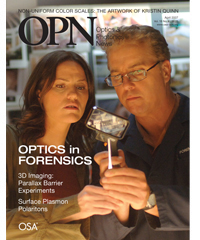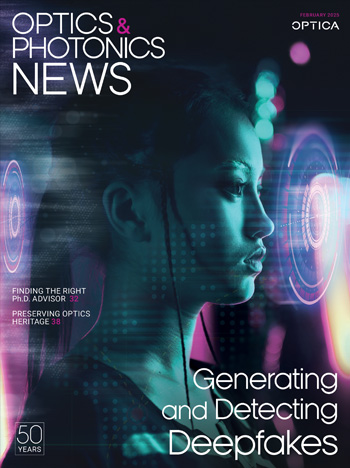Feature Articles
Optics in Forensics: Separating Science from Fiction
In recent years, forensic science has been glamorized in prime-time television and movies. Beyond the special-effects magic, new optical technologies are making their way into the crime lab—as quickly as budgets and trial judges will allow.
by Patricia DaukantasWelcome to the Wonderful World of 3D: Parallax Barrier Experiments Part IV
The first two installments in this four-part series explored the history and principles of 3D imaging, and the third included anaglyph experiments. This fourth and final article provides instructions for parallax barrier experiments.
by Keigo IizukaNon-Uniform Color Scales: The Artwork of Kristin Quinn
What is the color of amber? Iron ore? Pollen? How can wind and water be suggested? Kristin Quinn, daughter of former OSA Executive Director Jarus Quinn, explores such questions every day through her dynamic artwork.
by Kristin QuinnSurface Plasmon Polaritons on Metallic Surfaces
Recent advances in nano-fabrication have enabled a host of nano-photonic experiments involving subwavelength metallic structures. This activity has, in turn, reawakened interest in surface plasmon polaritons (SPPs). Here, numerical simulations are used to verify the detailed structure of long-range SPPs.
by Masud Mansuripur, Armis R. Zakharian and Jerome V. MoloneyDepartments and Columns
Concentrating on Low-Cost Solar Technology
Soliant Energy probes an unlikely source for inspiration: its customers.
Science and Competitiveness: The Whole World is Worrying
American scientists who are concerned about their nation’s long-term prospects in science and economic competitiveness can take comfort from this fact: There is equal concern from the world science community.
OSA Meetings in the 1970s and 1980s
Too big? Too small? Too many? Too few? Throughout the 1970s and ’80s, OSA worked to get its meeting mix just right.
OPN Talks with Alan J. Heeger
Our conversation with Alan J. Heeger, Nobel Prize Winner and CLEO/QELS Plenary Speaker.
Slow Light Pulses Carry Information
Two-dimensional images can be delayed without destroying the information they carry—even at such low light levels that each pulse averages less than one photon.
Unusual Beetles Display Brilliant Whiteness
A type of beetle from southeastern Asia could teach scientists how to make delicate yet bright display screens.
Did You Know?
UCSB researchers created the first such laser diodes by growing the diodes on a different side of a gallium nitride crystal
ADVERTISEMENT
ADVERTISEMENT
Also in this Issue
Book Reviews
Letters
After Image
OSA Today
The OSA Foundation
With your support, the OSA Foundation exceeded its 2006 fundraising goal and supplied resources to a variety of outreach programs.


![Illustration of a synapse in the brain. [Getty Images]](https://opnmedia.blob.core.windows.net/$web/opn/media/images/articles/2025/0425/departments/202504-cover-web.jpg?ext=.jpg)
![Fiber draped around a hand, demonstrating its flexibility. [Photo by Z. Wang and L. Wei]](https://opnmedia.blob.core.windows.net/$web/opn/media/images/articles/2025/0325/departments/202503-cover-web.jpg?ext=.jpg)
